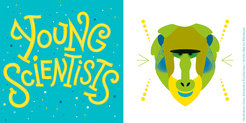The roads not taken
A new children’s book charts the many roads taken (or not) by scientists from Die Junge Akademie from childhood into a research career
Young Scientists, a children’s book published today by Die Junge Akademie and Hanser-Verlag, has a simple message: many roads (and detours, bypasses, forks and diversions) lead to a career in science. One of 30 Die Junge Akademie scientists featured in the new book, biologist Gisela Kopp tells how her boredom in high school genetics classes blossomed into a fascination with the evolution of animal genomes.

Every child is curious; but none starts out wanting to be a researcher per se. What, then, are the paths that actually lead to to a career in science?
In the book Young Scientists, Die Junge Akademie have partnered with Carl Hanser Verlag to tell the stories of 30 researchers from different disciplines who found their way into scientific careers. Stories tell of how an outsider in kindergarten became a professor of computer science. And how a legal scholar simply wanted to understand why rules are so important for our coexistence.
The illustrated book, aimed at children aged 12 and up, illuminates the varied first encounters and formative experiences in science; the coincidences and decisions; the sparks of insight and lasting interests. Together, the honest tales from the lives of scientists aim to inspire and awaken interest in research.
“The idea of the book was basically to show how different researchers were as kids, and what their motivation was to go into research,” said Gisela Kopp, an affiliated scientist at MPI-AB, and a member of the Zukunftskolleg and the Centre for the Advanced Study of Collective Behaviour at the University of Konstanz.
Kopp, who is a member of Die Junge Akademie, was involved in the production of the Young Scientists book, both as an editor and a featured scientist. She says that the team behind the publication wanted to shatter stereotypes about children who go on to become researchers.
“Most of them were not the one genius kid in class,” she says.
Rather, researchers come from very different backgrounds and trajectories. By showing the huge variety of places researchers start from, the team hope that more young people will see themselves in future science roles.
The book also works to broaden the definition of scientific work. Stories feature researchers from the humanities; social- and natural-sciences; and engineering. By doing so, Young Scientists highlights the many disciplines and questions that can be explored in science.
“Maybe with this we can motivate some kids to consider becoming researchers themselves,” says Kopp.
Due to be published on May 15, Young Scientists can be ordered here












